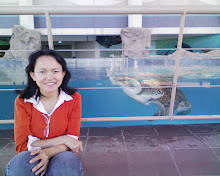"learning with the read/write web"
I used to think that blogging is simply a fun site. People blog just for sharing personal activities or experiences --> just like a diary. However, it turns out that blogging is also a tool for learning. Will Richardson in his blog: http://weblogg-ed.com/ stated:
"Learning in the 21st Century is all about networks and the connections we can make to other learners and teachers both in our communities and around the globe. But being literate in this new learning environment requires more than knowing how to read and write. It requires us to edit, publish, collaborate, create and connect in the process of building our own personal learning spaces."I do agree with him. I believe that students in this millenium generation need to know more than the previous ancestors. They cannot just sit in the classroom chair, listen to the teacher, do the homework, and complete the assignment. They should become better, and doing so doesn't mean that students need to learn harder. They just have to learn smarter.
Learning can happen anywhere, anytime and using any tools. With blogging, students not only get the reading and writing process, but also constructivism process. They will learn to think, analyze, create, design, and manage. Moreover, there are many free blog sites in the internet. One of the sites I found quite interesting is the Blogr.
 Blogr provides a free spot for us to create our own blog site. It's free, and they will also help you to design, manage, and publish your blog
Blogr provides a free spot for us to create our own blog site. It's free, and they will also help you to design, manage, and publish your blog
How to implement it in the classroom??
There are many ways doing it. Teachers can use it as a PBL lesson. Students can be assigned to create the blog, explore its features & use them, and collaborate with other web 2.0 tools.
As Mr. Richardson believed that "the almost limitless potential of Weblogs as a teaching tool is fostering an explosion of innovative projects, partnerships and techniques at every level of education from elementary school to graduate programs," blogging can become the powerful tool to create a meaningful learning.


